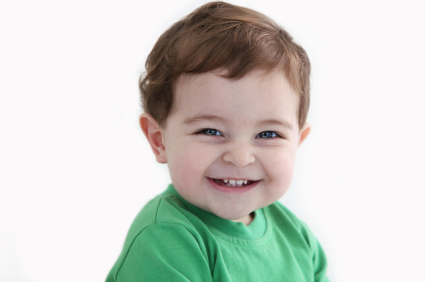I recently had the pleasure of volunteering in the annual American Dental Association’s “Give Kids A Smile” day, on Saturday, February 4th. Our group of volunteer dentists provided dentistry for Bay Area children in need, seeing 73 children and providing $35,647 worth of free dentistry. Now that’s something to smile about! 🙂 Since February was Children’s Dental Health month, I thought it’d be appropriate to address children’s dental health this post.
I often hear the same questions from parents about their children’s oral health: Is it okay to share utensils with my child? Does oral health matter before my baby has any teeth? Those are just baby teeth, why do they matter? When do I need to bring my child to their first dental appointment? Is it okay to put my baby to bed with a bottle? The trouble is, many parents don’t know the answers, which is why more than a quarter of California children under age five have untreated dental decay. Dental decay is still the most common childhood disease in America.
Even before your baby sprouts teeth, oral healthcare matters. You are setting your baby up for good dental health for life! The baby teeth are important, as they shape the growth and development of the permanent teeth.
Before your baby’s teeth come in, you should use a soft washcloth to swab your baby’s gums, keeping the mouth clean after feedings. Once the first tooth comes in, you should continue using the cloth to wipe down the teeth, until about age 12 months, when an age-appropriate toothbrush with a smear of non-fluoridated toothpaste should be introduced twice daily. As your child grows and learns how to spit, I would recommend a smear of fluoridated toothpaste instead.
Don’t share spoons and other utensils with your child, you are passing cavity-causing bacteria to them. Babies are not born with these bad guys–they come from their caretakers!
Your child needs to visit the dentist 6 months after they get their first tooth, which may fall between the age of 12-18 months. At the baby’s dental wellness visit, we examine the growth and development of the mouth, polish and clean the teeth, and offer parents counseling on diet, homecare, and what to expect as baby grows. This needs to be repeated every 6 months.
When it comes to night time bottle-feeding, it’s best to not put babies to sleep with anything other than water (if you have to give a bottle). Juice and milk contain sugars (yes, even milk has natural sugars) which can lead to cavities. This is “baby bottle decay.”
These are just some of the basic topics I wanted to address for now. Parents, if you have any questions, don’t hesitate to contact us. You can also stay updated by following us on Facebook and Twitter. Also, it’s getting to be that time of year for kindergarten registration–did you know California law requires a dental exam to register? We’d be happy to see your child–book your appointment now!
Cheers,
Vivian Tang, D.D.S.


